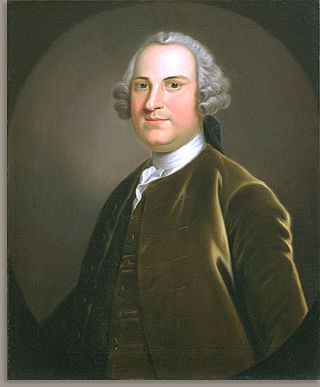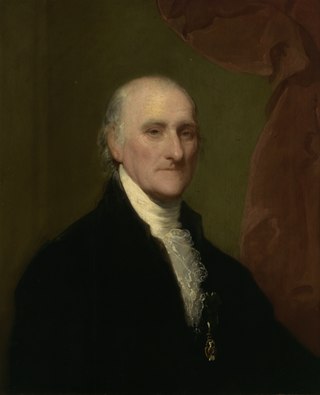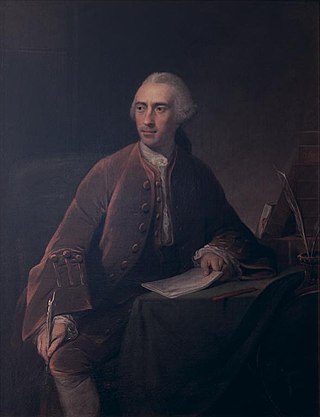Related Research Articles

Benjamin Franklin was an American polymath: a leading writer, scientist, inventor, statesman, diplomat, printer, publisher and political philosopher. Among the most influential intellectuals of his time, Franklin was one of the Founding Fathers of the United States; a drafter and signer of the Declaration of Independence; and the first postmaster general.

David Rittenhouse was an American astronomer, inventor, clockmaker, mathematician, surveyor, scientific instrument craftsman, and public official. Rittenhouse was a member of the American Philosophical Society and the first director of the United States Mint.

Christ Church Burial Ground in Philadelphia is an important early-American cemetery. It is the final resting place of Benjamin Franklin and his wife, Deborah. Four other signers of the Declaration of Independence are buried here, Benjamin Rush, Francis Hopkinson, Joseph Hewes, and George Ross. Two additional signers of the Declaration of Independence, James Wilson and Robert Morris, are buried at Christ Church just a few blocks away.

Michael Hillegas was the first treasurer of the United States.

Thomas Willing was an American merchant, politician and slave trader who served as mayor of Philadelphia and was a delegate from Pennsylvania to the Continental Congress. He also served as the first president of the Bank of North America and the First Bank of the United States. During his tenure there he became the richest man in America.

Charles Willing was an English-born merchant and politician who twice served as the mayor of Philadelphia, from 1748 until 1749 and again in 1754.
Humphry Marshall was an American botanist and plant dealer.

Samuel Selden Miles was an American military officer and politician, as well as a wealthy and influential businessman, active in Pennsylvania before, during, and after the American Revolutionary War.

Ephraim Avigdor Speiser was a Polish-born American Assyriologist and translator of the Torah. He discovered the ancient site of Tepe Gawra in 1927 and supervised its excavation between 1931 and 1938.

Joseph Hampton Moore was the 108th and 111th Mayor of Philadelphia and a Republican member of the United States House of Representatives from Pennsylvania.

William Temple Franklin Jr, known as Temple Franklin, was an American diplomat and real estate speculator who is best known for his involvement with the American diplomatic mission in France during the American Revolutionary War. Beginning at the age of 16, he served as secretary to his grandfather Benjamin Franklin, who negotiated and agreed to the Franco-American Alliance.

Robert Maskell Patterson was an American professor of mathematics, chemistry and natural philosophy at the University of Pennsylvania from 1812 to 1828 and professor of natural philosophy at the University of Virginia from 1828 to 1835. He served as the 6th director of the United States Mint from 1835 to 1851 and as president of the American Philosophical Society from 1809 to 1854.

William Smith was an Episcopal priest who served as the first provost of the College of Philadelphia, which became the University of Pennsylvania. He founded Washington College in Chestertown, Maryland, and St. John's College in Annapolis, Maryland. He founded the borough of Huntingdon, Pennsylvania, where he was a significant land owner.
William Coleman was a merchant, lawyer, municipal official, and judge in colonial Philadelphia.

Matthew Clarkson was the mayor of Philadelphia from 1792 to 1796. He was elected to the Confederation Congress in 1785, but did not attend.

Union Fire Company, sometimes called Franklin's Bucket Brigade, was a volunteer fire department formed in Philadelphia in 1736 with the assistance of Benjamin Franklin. It was the first firefighting organization in Philadelphia, although it was followed within the year by establishment of the Fellowship Fire Company. The fire company was formed on 7 December 1736 after a series of publications in the Pennsylvania Gazette by Franklin and others pointing out the need for more effective handling of fires in Philadelphia and remained active until approximately 1820. Although modeled after the Mutual Fire Societies of Franklin's native Boston, the Union Fire Company protected all members of the community rather than only the members of the company.

Samuel Vaughan (1720–1802) was an Anglo-Irish merchant, plantation owner, and political radical.
The University of Pennsylvania College of Arts & Sciences (CAS) is the oldest undergraduate college at the University of Pennsylvania, a private Ivy League university, situated on the university's main campus in University City, Philadelphia. The college traces its roots to the establishment of a secondary school known as Unnamed Charity School in 1740. In 1749, Benjamin Franklin and twenty-one leading citizens of Philadelphia officially founded a secondary school named the Academy of Philadelphia. In 1755, the secondary school was expanded to include a collegiate division known as the College of Philadelphia. The secondary and collegiate institutions were known collectively as The Academy and College of Philadelphia. The college received its charter from Thomas Penn and Richard Penn. Penn CAS is the oldest institution of higher learning in the state of Pennsylvania and the sixth-oldest chartered college in the United States.

Rozella May Schlotfeldt was an American nurse, educator, and researcher. Originally from DeWitt, Iowa, Schlotfeldt received her BS in nursing from the University of Iowa in 1935. She continued her studies at the University of Chicago in 1947 before becoming the dean of the Frances Payne Bolton School of Nursing at Case Western Reserve University in 1960.
References
- ↑ "Smith family papers, 1660-1941". dla.library.upenn.edu. Retrieved 2021-06-04.
- ↑ "Smith family papers, 1660-1941". dla.library.upenn.edu. Retrieved 2021-06-04.
- ↑ "Founders Online: To Benjamin Franklin from Samuel Preston Moore and Hannah Moor …". founders.archives.gov. Retrieved 2021-06-04.
- ↑ Marshall, Humphry. "Humphry and Moses Marshall papers 1721-1863". quod.lib.umich.edu. Retrieved 2021-06-04.
- ↑ "Moore, Samuel Preston, 1710-1785 - Social Networks and Archival Context". snaccooperative.org. Retrieved 2021-06-04.
- ↑ "APS Member History". search.amphilsoc.org. Retrieved 2021-06-04.